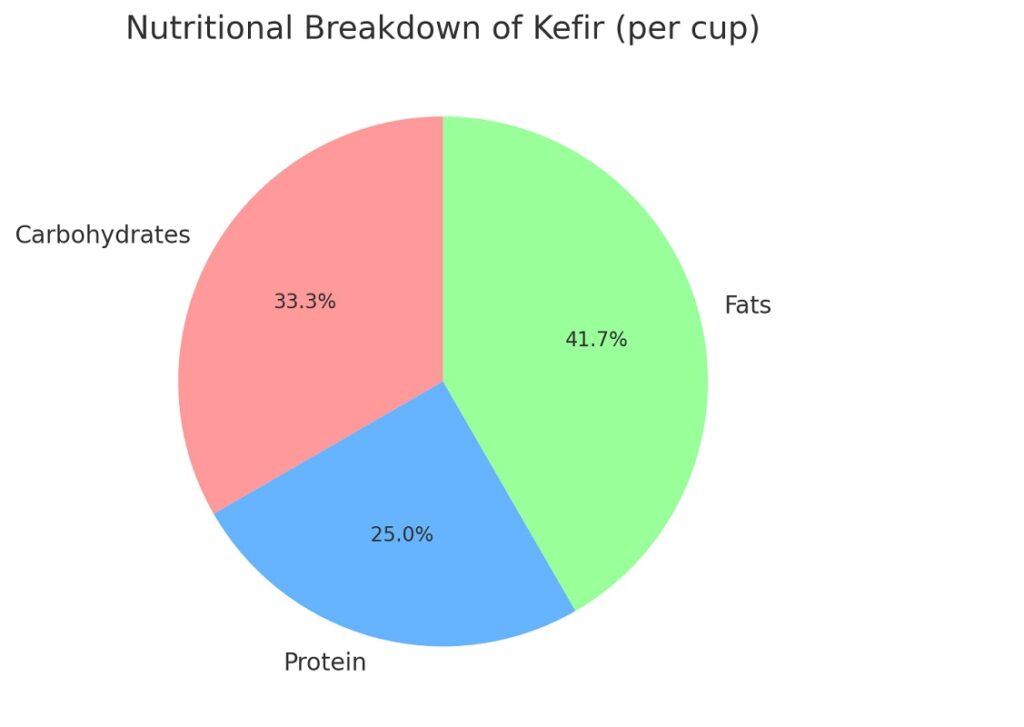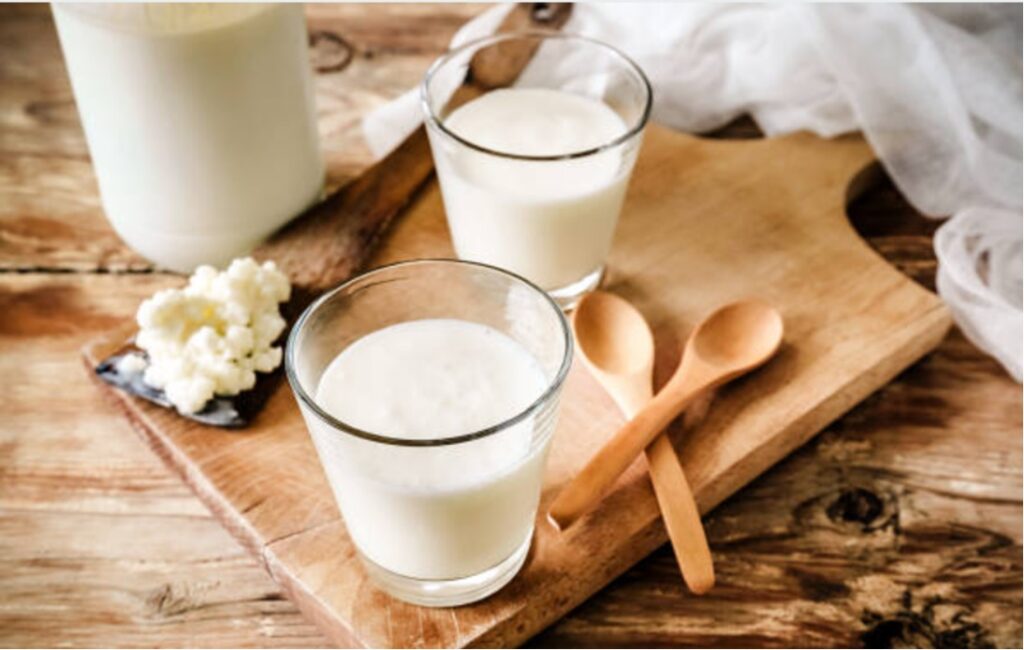The ketogenic (keto) diet has taken the world by storm with its promise of weight loss, improved energy, and enhanced mental clarity. But sticking to a low-carb lifestyle can be tricky, especially when it comes to including foods like kefir in your diet. Is kefir keto-friendly, or should it be avoided? Let’s explore if kefir on keto diet is good or bad.
What is Kefir?
Definition and Origins
Kefir is a fermented drink made by culturing milk with kefir grains, a combination of yeast and bacteria that work together to ferment the milk. Originating from the Caucasus Mountains, kefir has been enjoyed for centuries for its tangy flavor and numerous health benefits.
Types of Kefir
- Milk Kefir: Made from cow’s milk or goat’s milk, this is the most common type. Cow’s milk kefir, in particular, is rich in probiotics and nutrients.
- Water Kefir: A dairy-free option made by fermenting sugar water or coconut water with kefir grains.
- Dairy-Free Milk Kefir: Alternatives made from almond, soy, or coconut milk for those avoiding dairy.
How Kefir is Made
Kefir is created by adding kefir grains to milk, allowing fermentation to occur over 12-48 hours. The grains break down lactose and create a tangy, slightly fizzy drink that’s packed with probiotics, vitamins, and minerals.
Understanding the Keto Diet
What is the Keto Diet?
The ketogenic diet focuses on consuming high amounts of fat, moderate protein, and very low carbohydrates. By reducing carbs, the body enters a state called ketosis, where it burns fat for energy instead of glucose.
Why Carb Counts Matter
To stay in ketosis, most keto dieters aim to consume less than 20-50 grams of carbohydrates per day. This means even small amounts of high-carb foods, like certain dairy products, can impact progress.
Is Kefir Keto-Friendly?
Nutritional Breakdown of Kefir
The keto compatibility of kefir depends on its type and preparation. A one-cup serving (240ml) of plain, full-fat cow’s milk kefir typically contains:
- Calories: 150
- Carbs: 8-12 grams
- Protein: 6-8 grams
- Fat: 6-10 grams

While the carb count may seem high, it’s important to note that fermentation reduces lactose content, which is the primary source of carbs in milk.
Factors to Consider
- Serving Size: Consuming smaller portions (e.g., 1/4 cup) can make kefir more manageable on a keto diet.
- Store-Bought vs. Homemade: Commercial kefir often contains added sugars, which can significantly raise carb content. Homemade kefir allows you to control the ingredients and fermentation process.
Best Types of Kefir for Keto
- Plain, Full-Fat Kefir: Best option for keto dieters. Avoid flavored varieties with added sugars.
- DIY Kefir: Using kefir grains at home ensures a sugar-free, carb-controlled product.
Health Benefits of Kefir
Kefir offers an array of health benefits, many of which align with keto’s focus on improving overall wellness.
1. Gut Health
Kefir is rich in probiotics, which help maintain a healthy gut microbiome. Compared to yogurt, it contains a greater variety of beneficial bacteria and yeast, offering superior digestive benefits.
2. Lactose Digestion
The fermentation process in kefir reduces lactose content, making it easier to digest for people with lactose intolerance. This benefit aligns well with keto’s focus on reducing inflammatory foods.
3. Immune Support
The probiotics and nutrients in kefir, such as vitamin B12, calcium, and magnesium, support immune function, an essential consideration for those looking to maintain health on restrictive diets.
4. Improved Sleep and Stress Management
Research suggests that kefir may enhance relaxation and support better sleep, potentially through its gut-brain axis benefits.
How to Include Kefir on a Keto Diet
Tips for Choosing the Right Kefir
- Check Labels: Look for “unsweetened,” “plain,” or “no added sugar” varieties.
- Focus on Quality: Opt for kefir made from whole cow’s milk or buy kefir grains to make your own. Sourcing kefir grains locally (e.g., kefir grains in the UK) ensures freshness.
DIY Kefir Recipes
- Ingredients:
- 1-2 tablespoons of kefir grains.
- 2 cups of whole milk (cow’s milk kefir is ideal).
- Instructions:
- Place kefir grains in a glass jar and add milk.
- Cover loosely with a cloth and let ferment at room temperature for 12-24 hours.
- Strain the grains and refrigerate your kefir. The grains can be reused for the next batch!
Serving Ideas
- Add a splash of plain kefir to your morning smoothie (use keto-friendly ingredients like spinach, avocado, and unsweetened almond milk).
- Use kefir as a creamy base for salad dressings or marinades.
- Enjoy a small glass as a probiotic-rich snack.
Common Myths About Kefir and Keto
- Does Fermentation Remove All Carbs?
While fermentation reduces lactose, it doesn’t eliminate all carbs. Portion control is key. - Is Kefir Safe for the Lactose-Intolerant?
Yes! The fermentation process breaks down most lactose, making kefir easier to digest than regular milk.
Final Verdict: Is Kefir OK on Keto?
The short answer is yes, kefir can be keto-friendly when consumed mindfully. Full-fat, plain kefir or homemade kefir are the best choices. By controlling your portion sizes and carb intake, you can enjoy the health benefits of kefir without disrupting ketosis.
YOU MAY ALSO LIKE: Transition into Keto from a High Carb Diet
While kefir is not inherently keto-friendly due to its carbohydrate content, it can still be enjoyed in moderation or with low-carb adjustments. Whether you’re sipping it for its gut health benefits, immune support, or potential to enhance sleep, kefir offers unique advantages. Homemade or unsweetened versions are your best bet for keeping it keto-compatible.
For those in the UK, consider sourcing kefir grains to make your own low-carb kefir at home. With careful portioning and planning, kefir on keto diet can be a delicious and healthful addition to your ketogenic lifestyle.


